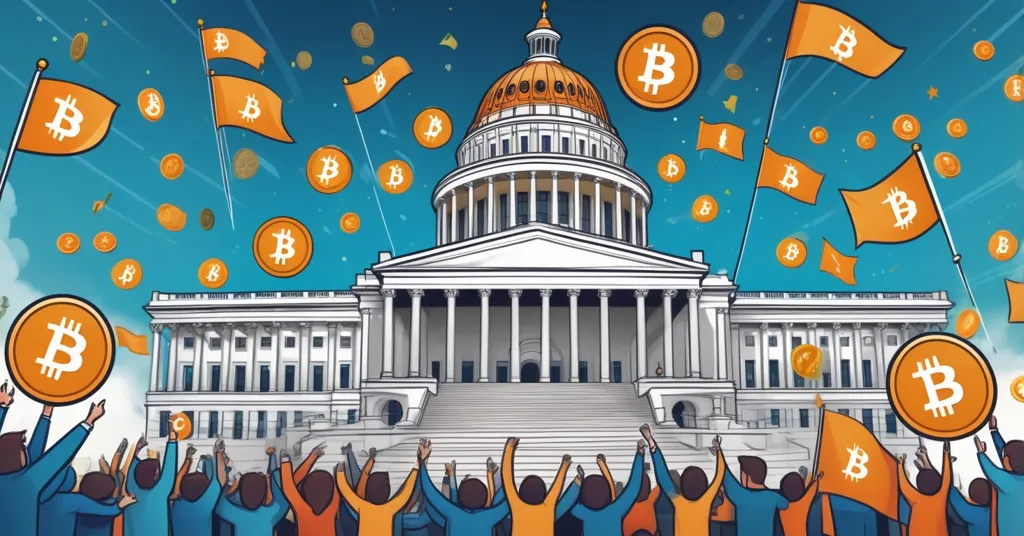New Hampshire Pioneers Bitcoin Investment: First US State to Allocate 5% of State Portfolio

New Hampshire Leads the Way: First US State to Invest in Bitcoin
New Hampshire has taken a pioneering step in the realm of public finance by becoming the first US state to allow its state treasury to invest in Bitcoin. This move, which could set a precedent for other states, reflects a growing interest in cryptocurrencies as legitimate financial assets.
- New Hampshire permits 5% Bitcoin investment in state portfolio
- Law signed by Governor Kelly Ayotte
- Celebrated as a historic move by crypto community
- Other states and federal efforts face legislative hurdles
The New Law
On May 6, 2025, Governor Kelly Ayotte signed House Bill 302 into law, empowering the state treasurer to allocate up to 5% of New Hampshire’s portfolio to Bitcoin and other cryptocurrencies with a market cap (total value of all outstanding coins) over $500 billion. This groundbreaking legislation, which will take effect in 60 days, marks a significant turning point in the state’s approach to finance and investment. It’s not just about investing in digital assets; it’s about embracing the future of money.
The legislative journey of House Bill 302 was marked by spirited debates, with proponents arguing that this move aligns with New Hampshire’s innovative spirit and acts as a hedge against inflation. Critics, however, expressed concerns about the volatility of cryptocurrencies and the potential risks to the state’s financial health. Despite these concerns, the bill passed, showcasing the state’s willingness to venture into uncharted financial territory.
Community and Official Reactions
The response from state officials and the crypto community has been overwhelmingly positive. Governor Ayotte celebrated the new law on social media, stating:
New Hampshire is once again First in the Nation! 🎉 Just signed a new law allowing our state to invest in cryptocurrency and precious metals.
The New Hampshire House Republicans echoed this sentiment, proclaiming:
The Live Free or Die state is leading the way in forging the future of commerce and digital assets.
Dennis Porter, co-founder of the Satoshi Act Fund, described the decision as:
This is history in the making.
These reactions highlight the enthusiasm and optimism surrounding New Hampshire’s bold step into the world of cryptocurrencies.
Challenges and Progress in Other States
While New Hampshire charts its course, other states like Arizona and Florida have encountered setbacks in their crypto legislation endeavors. Arizona’s bill was shot down by Governor Katie Hobbs, a clear setback for crypto adoption. Florida withdrew two similar bills from consideration, indicating the challenges states face in navigating this new financial frontier. At the federal level, the landscape remains fraught with uncertainty, particularly around the regulation of stablecoins (cryptocurrencies pegged to a stable asset like the US dollar) and the passage of bills like the Strategic Bitcoin Reserve Act and the BITCOIN Act. These federal efforts, championed by figures like Senator Cynthia Lummis, have yet to gain significant traction.
Despite these challenges, other states are actively pursuing their own Bitcoin reserve laws. Texas and North Carolina have made progress, with one chamber in each state having already passed the bill. This momentum suggests that New Hampshire’s move could serve as a catalyst for broader adoption across the US.
Market Impact and Risks
Interestingly, Bitcoin’s price showed minimal reaction to this news, increasing by only 0.5% in the last 24 hours and remaining in the $94,000 to $95,000 range. This lack of immediate market impact might suggest that investors are taking a wait-and-see approach, assessing how New Hampshire’s investment strategy unfolds.
New Hampshire’s decision to allocate part of its state portfolio to Bitcoin is not without risks. The volatile nature of cryptocurrencies could potentially lead to significant fluctuations in the state’s financial health. However, proponents argue that this move is a hedge against inflation and a diversification strategy that aligns with the state’s innovative spirit. The law includes stringent requirements for secure custody solutions, ensuring that the state’s digital assets are managed safely. These solutions involve using qualified custodians or secure storage methods designed to protect against theft and loss.
The impact of such state-level investments on the broader economy is a topic of much discussion, with some insights available on Quora.
Bitcoin Maximalist Perspective
From a Bitcoin maximalist viewpoint, New Hampshire’s move is a validation of Bitcoin’s role as a store of value and a hedge against inflation. While Bitcoin maximalists might argue that this decision underscores Bitcoin’s superior position in the crypto ecosystem, it’s important to recognize that other cryptocurrencies also play significant roles. Altcoins and platforms like Ethereum serve unique purposes, filling niches that Bitcoin alone may not cover. This diversity in the crypto space is essential for a robust and resilient financial ecosystem.
Future Implications
New Hampshire’s pioneering move could have far-reaching implications. It may encourage other states to follow suit, leading to increased adoption and integration of cryptocurrencies into traditional financial systems. At the federal level, this could spur more decisive action on crypto legislation, potentially paving the way for bills like the Strategic Bitcoin Reserve Act and the BITCOIN Act to gain traction. The broader acceptance of cryptocurrencies as legitimate financial assets could reshape the future of money and finance across the nation.
The progress of New Hampshire’s cryptocurrency legislation can be tracked on Nasdaq.
Key Takeaways and Questions
-
What does New Hampshire’s new law allow?
New Hampshire’s new law allows the state treasurer to invest up to 5% of the state’s portfolio into Bitcoin and other cryptocurrencies with a market cap over $500 billion. -
How has the crypto community and state officials reacted to New Hampshire’s decision?
The decision has been celebrated by state officials and the crypto community as a pioneering move, with figures like Dennis Porter of the Satoshi Act Fund calling it “history in the making.” -
What challenges are other states and the federal government facing with crypto legislation?
Other states like Arizona and Florida have faced setbacks with similar bills being vetoed or withdrawn. At the federal level, there are ongoing debates and uncertainties, particularly around the regulation of stablecoins and the passage of bills like the Strategic Bitcoin Reserve Act and the BITCOIN Act. -
Which other states are working on Bitcoin reserve laws?
Texas and North Carolina are actively working on their own Bitcoin reserve laws, with one chamber in each state having already passed the bill. -
How has Bitcoin’s price reacted to New Hampshire’s new law?
Bitcoin’s price showed a minimal reaction, increasing by only 0.5% in the last 24 hours and remaining in the $94,000 to $95,000 range.
For more detailed discussions and community reactions, visit the CryptoCurrency subreddit.
For a comprehensive overview of New Hampshire’s Bitcoin investment strategy, refer to the Wikipedia page on the Strategic Bitcoin Reserve.
The potential economic impacts of such state investments in Bitcoin are discussed in depth at OneSafe’s blog.



